8Aunit3教材知识点全解
新译林8A英语UNIT 3单元知识点归纳及练习题
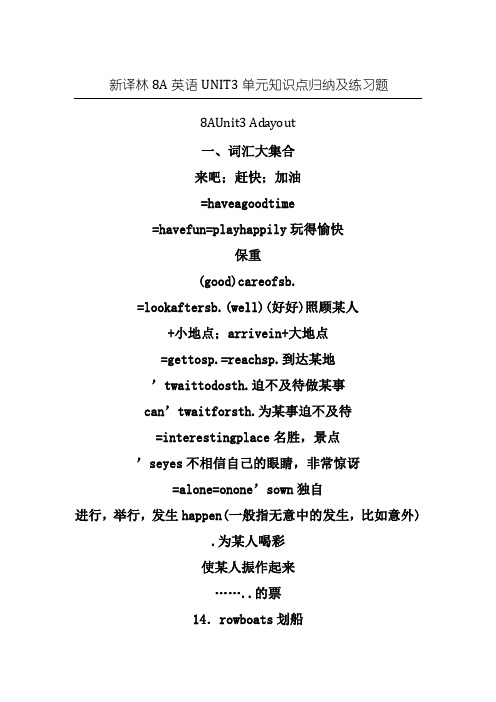
新译林8A英语UNIT3单元知识点归纳及练习题8AUnit3 Adayout一、词汇大集合来吧;赶快;加油=haveagoodtime=havefun=playhappily玩得愉快保重(good)careofsb.=lookaftersb.(well)(好好)照顾某人+小地点;arrivein+大地点=gettosp.=reachsp.到达某地’twaittodosth.迫不及待做某事can’twaitforsth.为某事迫不及待=interestingplace名胜,景点’seyes不相信自己的眼睛,非常惊讶=alone=onone’sown独自进行,举行,发生happen(一般指无意中的发生,比如意外).为某人喝彩使某人振作起来……..的票14.rowboats划船需要锻炼并保持健康=keephealthy保持健康sohighasarealone不如真的高制定一天旅行计划计划一日出游=goonatripbyboat乘船旅行以…著名befamousas作为…著名在著名的港湾大桥下(Sydney)OperaHouse经过(悉尼)歌剧院坐在塞纳河旁边的一个小咖啡馆…………的顶部一切顺利,万事如意,一帆风顺27..thePresidentoftheUSA美国总统在网上搜索多宽英尺宽由……制成(能看出原材料)bemadefrom由…制成(不能看出原材料),000tons称重超过10万吨邀请某人做某事邀请某人去某地World Park和某人一起做某事joinus加入我们join加入(某人或组织)=becomeamemberofjointhearmy参军,入伍jointheParty入党joinin=takepartin参加(活动)晴好而温暖的一天在晴朗的蓝天下照耀相当遥远much/heavytraffic交通拥挤一点儿无聊off上车/下车整个世界全世界超过100多个名胜古迹的模型变得兴奋看上去和家乡的一样棒看上去就像真的令人惊讶的一天世界上主要的景点歌舞表演了解许多不同的文化把他们放在他的主页上去亲自看看=atlast=intheend最后在某些方面’ttellanyoneaboutthis不要告诉任何人关于此事.努力/尽力做某事把他自己拉上岩石互相看着对方保守秘密在心里’sbasketballcompetition进入到今年篮球赛决赛gettothefinal进入决赛’Union学生会为…欢呼忘记要做某事forgetdoingsth.忘记做过某事.记得要做某事rememberdoingsth.记得做过某事在你的支持下/有了你的支持在你的帮助下/有了你的帮助旅行的费用每个学生乘地铁去那乘地铁一个20分钟期间在中场休息期间=returntoourschool回我们学校Summer Palace带某人去颐和园听起来好前天后天感到兴奋和兴高采烈收信人姓名这封信的目的结尾辞在阳光地铁站走去北海公园在王府井大街最大的城市广场常用反身代词短语enjoyoneselfhurtoneselfdressoneselfhideoneselfwashoneself byoneselfthethingitselfloseoneselfin….helponeselfto….teachoneself(todo)(todo)lookatoneselfinthemirrorkeepthesecrettooneself二、句型大集合,isn’tit注意反意疑问句的构成和回答(根据事实回答),Theweightofthebridgeisover100,花时间做某事。
牛津译林版8AUnit3知识点同步梳理
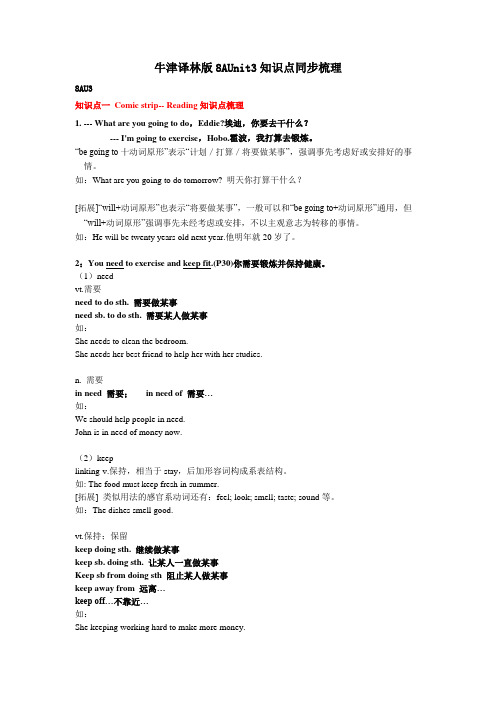
牛津译林版8AUnit3知识点同步梳理8AU3知识点一Comic strip-- Reading知识点梳理1. --- What are you going to do,Eddie?埃迪,你要去干什么?--- I'm going to exercise,Hobo.霍波,我打算去锻炼。
“be going to十动词原形”表示“计划/打算/将要做某事”,强调事先考虑好或安排好的事情。
如:What are you going to do tomorrow? 明天你打算干什么?[拓展]“will+动词原形”也表示“将要做某事”,一般可以和“be going to+动词原形”通用,但“will+动词原形”强调事先未经考虑或安排,不以主观意志为转移的事情。
如:He will be twenty years old next year.他明年就20岁了。
2:You need to exercise and keep fit.(P30)你需要锻炼并保持健康。
(1)needvt.需要need to do sth. 需要做某事need sb. to do sth. 需要某人做某事如:She needs to clean the bedroom.She needs her best friend to help her with her studies.n. 需要in need 需要;in need of 需要…如:We should help people in need.John is in need of money now.(2)keeplinking-v.保持,相当于stay,后加形容词构成系表结构。
如: The food must keep fresh in summer.[拓展] 类似用法的感官系动词还有:feel; look; smell; taste; sound等。
如:The dishes smell good.vt.保持;保留keep doing sth. 继续做某事keep sb. doing sth. 让某人一直做某事Keep sb from doing sth 阻止某人做某事keep away from 远离…keep off…不靠近…如:She keeping working hard to make more money.I’m sorry to keep you waiting for me.We should keep away from danger all the time.Please keep off the grass in the park.(3)fitadj.健康的;合适的be fit for适合…be fit for sb. to do sth.适合某人做某事如:Keeping fit is always important.She is fit for the position.vt.fit sb 适合某人The coat fits you well.3:Come on,Hobo. Let's enjoy ourselves! (P30)快点,霍波。
8Aunit3教材知识点全解
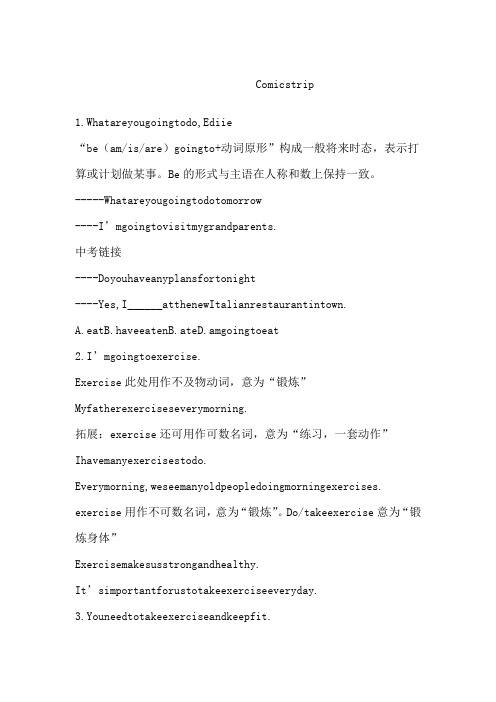
Comicstrip1.Whatareyougoingtodo,Ediie“be(am/is/are)goingto+动词原形”构成一般将来时态,表示打算或计划做某事。
Be的形式与主语在人称和数上保持一致。
-----Whatareyougoingtodotomorrow----I’mgoingtovisitmygrandparents.中考链接----Doyouhaveanyplansfortonight----Yes,I______atthenewItalianrestaurantintown.A.eatB.haveeatenB.ateD.amgoingtoeat2.I’mgoingtoexercise.Exercise此处用作不及物动词,意为“锻炼”Myfatherexerciseseverymorning.拓展:exercise还可用作可数名词,意为“练习,一套动作”Ihavemanyexercisestodo.Everymorning,weseemanyoldpeopledoingmorningexercises. exercise用作不可数名词,意为“锻炼”。
Do/takeexercise意为“锻炼身体”Exercisemakesusstrongandhealthy.I t’simportantforustotakeexerciseeveryday.3.Youneedtotakeexerciseandkeepfit.(1)need此处用作及物动词,意为“需要”,主要有以下用法needsth需要某物Theydon’tneedanyhelp.needtodosth需要做某事Heneedstohaveagoodrest. needdoingsth某事需要被做(与needtobedone同义)Theseflowersneedwatering.拓展:need做情态动词讲时,没有人称、时态和数的变化,后接动词原形,主要用于否定句或疑问句中。
Unit3重点内容梳理牛津译林版英语八年级上册

常州市2023年牛津译林版8AU3重点内容梳理一.重点词组来吧,赶快e on需要锻炼来保持健康need to exercise and keep fit玩的愉快enjoy oneself不如…高not as …as…保重take care一座带有大花园的大楼a building with a big garden美国总统the President of the USA由钢制成be made of steel90英尺宽90 feet wide重10万多吨weigh over one hundred thousand tons二.词汇变化1.这个宝藏大约在地下十英尺的地方。
The treasure is about ten feet under the ground.名词英尺foot 复数feet另外一个意思脚foot2.我们昨晚在他的聚会上玩的很开心。
We enjoyed ourselves at his party last night.词组玩的开心enjoy oneself反身代词与主语保持一致,这里的主语是we,反身代词用ourselves 注意复数单词拼写同义词短语玩的开心have a good time /have fun3.事实上,在我家房前的这条河比那条宽得多.In fact, the river in front of my house is wider than this one.句子中出现了比than 说明形容词要对应变成比较级形式形容词宽的比较级更宽的wider4.你知道那儿的澳大利亚人吗?他们正看着你.Do you know the Australians over there ? They are looking at you.名词澳大利亚人Australian,注意名词复数形式,Australians句子后面用的是they代词,说明前面的澳大利亚人是复数形式5.他真的对收集邮票感兴趣。
初中英语 牛津译林版8A Unit3重要知识点

8A U3【welcome】1.be going to (1)表示“意图”,即打算在(不久的)将来做某事。
(2)表示“预见”,即现在已有迹象表明将要发生或即将发生某种情况。
►be going to & will的区别(7B 将来时态)②用来表示请求,鼓励,劝说等“行啦;来吧”③表示责备或不耐烦“得了,行啦,够啦”④用于体育竞赛等场合鼓励队员“加油”3.take a boat trip乘船旅行take a .....trip to spl. 去...旅行(地点是副词时,不用to)4.take care保重;小心(=look out /be careful)5.by+时间“到...时”by+地点“在...旁”by+交通工具“乘...”by用于被动语态“被....,由...”by the way顺便问一下by oneself(=on one’s own)独自adj.顶尖的,最好的top students尖子生8.How wide is the bridge?询问某物的宽度:How wide....?“How+adj.”询问某物/某人的特征9.be made of & be made from & be made in10.over = more than “超过;多于”【reading】1.invite sb to do sth邀请某人做某事invite sb to spl.邀请某人去某地invite--invitation2.join 参加某个组织或团体,并成为其中一员join in 参加某个活动join sb in (doing) sth 和某人一起做某事take part in 参加会议或群众性活动,并在活动中发挥作用3.The sun was shining in a clear blue sky.was/were+v-ing 过去进行,表示过去某个时间点或时间段正在发生或者某人正在做某事4.There was a lot of traffic on the way and journey was a little boring.不可数bored&boringa lot of traffic/busy traffic/heavy traffic交通繁忙5.We finally arrive at the park.[finally] adv “最终,最后”,可与“first, next, then”连用,表示一个过程的先后顺序,可位于句首、句中、句末。
牛津译林版八年级上 8A Unit3 知识点梳理

8A Unit3 知识点解析与练习1. What are you going to do? 你打算做什么?2. a day out 外出的一天 a big day out 充实的外出一天plan a day out 计划外出的一天plan v. 计划过去式____________ 现在分词_________________n. 计划[C] 未来计划a future plan / future plans3. exercise v. 锻炼I’m going to exercise. 我打算锻炼n. [C] 两操一练: 眼保健操eyes exercises 早操: morning exercises 练习exercises[U] 锻炼do exercise4. climb v. 攀爬攀爬者,登山者: ________________climb a hill 爬山这山很难爬。
This hill is hard _________________.攀爬: climb the rocks = go climbing on the rocks = pull oneself up the rocks5. need v. 需要1). need … 需要… 需要你的支持need your support (support n. 支持)2). need sb. to do sth. 需要某人做某事need you to support us. (support vt. 支持)3). need to do sth. 需要去做某事不需要去做某事: don’t need to do sth. = don’t have to do sth. = needn’t do sth.6. keep v. 保持keep fit 保持健康v. 保存, 保留keep the ticket 保留着门票7. come on 来吧; 加油;算了吧--- Teddy told me her grandfather can run for 1 hour.--- ___________! Her grandfather is nearly 80 years old. I don’t believe her words.A. Come inB. Come onC. Come toD. Come into8. enjoy oneself (doing sth) = have fun (doing sth) = have a good/great time (doing sth)(做某事)很开心9. take a trip to sp. 去某地旅行= go on a trip to sp. = go to sp. for a triptake a boat trip 乘船旅行= take a trip by boat乘飞机去北京旅行_________________________=___________________________10. pass v. 经过过去式______________past adv. 经过pass = go past passes = goes past passed = ________________11. take care 保重(口语交际, 书信结尾) take care of oneself 照顾自己12. sit in a little coffee shop 坐在一个小咖啡店里by the River Seine 塞纳河畔by的用法: by the way 顺便说一下; by 地点: 靠近…(by the window); by + 时间: 到…为止(by 1997); by 表被动(an article by a boy from the USA 来自美国的一个男孩写的文章)13. on/at the top of … 在…的顶部on the top floor 在顶层go to the top of … 去…的顶部top students 尖子生14. a beautiful building with a big garden 一个带有大花园的漂亮建筑物(with…作后置定语)15. 美国总统16. Australia n. 澳大利亚Australian n. 澳大利亚人adj. 澳大利亚的一个澳大利亚人_____________________很多澳大利亚人_________________________17. places of interest 名胜古迹main sights 主要景点18. search (on) the Internet for some information 在网上搜寻一些信息19. --- How long is the Golden Gate Bridge? 金门大桥有多长?--- It’s very long, about 1.7 miles. 非常长,大约1.7英里。
8AUnit3重点讲解

8AUnit3重点讲解8A Unit3 重点讲解Welcome:1. be going to do sth. 打算做某事国庆节那天你打算做什么?我打算看⼀部电影。
What are you going to do on National Day?I’m going to see a film /movie.2. need to do sth.需要做某事need 1) 情态动词needn’t do sth. We needn’t get up early on Sunday morning.2) 实意动词need to do sth. We need to get up early on weekdays.don’t need to do sth. We don’t need to get up early on Sunday morning.need sth/ don't need sth need your help3. not as …as= not so… as不如……英语不如汉语难。
English is not as difficult as Chinese.做数学练习不如打游戏有趣。
Doing maths exercises is not as/so interesting as playing games.4. 玩得愉快enjoy oneself = have fun= have a nice/great /wonderful/lovely time (doing sth)5. take a boat trip 乘船游玩昨天我们乘船游览了太湖。
We took a boat trip on the Taihu Lake yesterday.明天天我们将乘船在那座桥下游玩。
We will take a boat trip under the bridge.6. a little coffee shop(by the River Seine)塞纳河畔的⼩咖啡馆悉尼歌剧院旁的⼀家书店a bookshop by the Sydney Opera House7. a beautiful building (with a big garden and many trees) 有个⼤花园和许多树的漂亮建筑8. How long /wide/heavy is ……?……多长/宽/重?长江有多长?6300多公⾥。
牛津英语8A Unit 3 重点讲解

8A Unit 3 重点讲解2018年8月11日16:24:041) exercise①“练习”可数②“体育锻炼”不可数③“体操”可数do eye/morning exercises2) hope to do sth hope + that从句,that常省略,例:We hope (that) you can/ will help me.3) enjoy oneself = have a good / great / wonderful time (in) doing sth. = have fun doing sth.4) arrive at 到达“小地点”;arrive in到达“大地点”;get to sp; reach sp5) s ee/hear/watch/notice/feel…+sb. do/doing sth.6) stop/go on to do sth. 停下来/继续做另一件事stop/go on doing sth. 停下/继续同一件事人spend some time /money doing sth 人pay some money for sth7) 物costs sb + money to do sth 物takes sb +time to do sththe cost of …“……的费用”The cost of the trip is 50 yuan. fare指船费、车费等8) “由…制成”be made of; be made from9) be able to do sth 能够做某事10) the whole + 名词= all the + 名词“整个……”10) in front of 在…前面;in/at the front of 在事物内部的前面at the back of…在…的后面11) as soon as sb can = as soon as possible “尽快”13) with“带有”,作状语或定语12) how long/ how often/ how soon的用法13) a little, much, a lot, even等修饰可以形容词比较级;出现of the two短语,比较级前要加the;“…times +比较级+than…”表示倍数;用“数词+名词+比较级”表示“大几岁”14)一些动词的搭配①allow/ ask/ encourage/ expect/ get/ hate/ invite/ like/ tell/ want/ warn/ wish sb to do sth②agree/decide/fail/hope/want/plan/prepare/forget/remember/begin/start/learn/wish to do sthget sb to do sth teach oneself to do sth③look forward to doing sth is/ was/ are/ were busy + doing sth thanks for doing sth try doing sth; forget doing sth; enjoy doing sth;④let sb do sth why not+动词原形=why don’t sb+动词原形。
8AUNIT3(全)

海豚教育个性化简案学生姓名:年级:八科目:英语授课日期:月日上课时间:时分------ 时分合计:小时教学目标1.掌握as....as引导的比较状语从句2.掌握-ful 和-less构成的形容词3.掌握8AUNIT3重点单词及短语重难点导航1.As...as的用法2.反身代词的用法3.重点单词及短语教学简案:一、真题演练【2012江苏宿迁;2012江苏盐城;2012浙江杭州】二、8AUNIT3知识点梳理1、as...as引导的比较状语从句2、反身代词的用法3、重点单词及短语三、错题汇编四、个性化作业授课教师评价:□准时上课:无迟到和早退现象(今日学生课堂表□今天所学知识点全部掌握:教师任意抽查一知识点,学生能完全掌握现符合共项)□上课态度认真:上课期间认真听讲,无任何不配合老师的情况(大写)□海豚作业完成达标:全部按时按量完成所布置的作业,无少做漏做现象审核人签字:学生签字:教师签字:备注:请交至行政前台处登记、存档保留,隔日无效(可另附教案内页)大写:壹贰叁肆签章:海豚教育个性化教案(真题演练)真题演练:【2012江苏宿迁】The meat smells__________ . Throw it away.A. wellB. goodC. badlyD. bad【2012江苏盐城】Don’t talk to anyone about the bad news —____________ not my mother.A. hardlyB. usuallyC. especiallyD. simply【2012天津】Who listens _________, Tom, Jack or Bill?A. the most carefullyB. more carefullyC. the most carefulD. more careful【2012浙江杭州】— Do you consider yourself a rude person?— ________ not. I always have good manners.A. ProbablyB. UsuallyC. GenerallyD. Certainly【2012浙江嘉兴】The fire last night destroyed many buildings.________ , no one was killed.A. ActuallyB. SimplyC. LuckilyD. Immediately海豚教育个性化教案(内页)&Welcome to the unit&Reading&VocabularyComic strip卡通漫画一、重点短语1. not …any more再也不=no more,no more, no longer用于be动词后、行为动词前〈知识链接〉⑴not …any more=no mor e…再也不…(表示程度、数量上的不再)⑵not …any longer=no longer…不再…(表示时间上的不再延续) e.g.①When the baby saw his mother, he did not cry any more.②After having some bread, she was no longer hungry.〈用法拓展〉⑴more and more…越来越…;越来越多… ⑵more or less几乎;差不多Welcome to the unit1. Which city do you want to go to?〈知识链接〉该句的疑问词which作go to的宾语,不能使用where。
[译林版]8A Unit3知识点详解和习题
![[译林版]8A Unit3知识点详解和习题](https://img.taocdn.com/s3/m/191964375f0e7cd18425362d.png)
课 题(课型) 复习:8A Unit3知识点教 学 目 标或考 点 分 析: 1.了解并列句,掌握并列连词 and, but 和or 。
2 掌握动词不定式的用法 3.掌握反身代词的用法。
教学重难点:教学方法: 知识梳理、例题讲解、归纳总结、巩固训练复习目标:Task1: Words 1. 默写下列单词(20个单词)(1)我们自己 (2)问候 (3)总统 (4) 外国的(5)开始 (6)长途汽车 (7)交通 (8) 模型(9)金属 (10)兴趣 (11)胃,肚子 (12)美,美丽(13)可能的 (14)他们自己 (15)它自己 (16) 幸运的(17)入场劵 (18)获胜者 (19)代替 (20) 机场Task2: the important phrases and sentences1.Phrases 英汉互译2. the important sentences (ways: read& remember )①You need to exercise and keep fit.②It is a beautiful building with a big garden and many trees.③ It was a great day but we did not enjoy it at the beginning .④There was a lot of traffic on the city roads but it got better when we were on the highway.⑤ Kitty and I did not feel sick any more. ⑥let us know as soon as possible .⑦There are over a hundred places of interest from all over the world⑧Kitty’s cl assmate Daniel taught himself how to make a home page .⑨Go and see for yourself.4. Tell the differences between them (discussion in your group)1 interest/ interesting /interested①the Present of the USA _______________②all over the world _________________③ a lot of traffic _________________④ the song and dance parad _____________⑤ take place______________________⑥the song and dance parade ______________⑦ some photos of the trip ________________⑧watch the sunset______________________ ⑨feel the beauty of the old park ___________ ⑩make up one ’s mind ___________________①捉迷藏 ______________________ ②过得愉快 _____________________ ③乘船旅行 _____________________ ④为---欢呼 _____________________ ⑤在开始 _____________________ ⑥上长途汽车 ____________________ ⑦为某人保密 ____________________ ⑧自学 _____________________⑨照顾、照料 _____________________⑩在下半场 ________________________1 I’m _____________ in this ________________story.2 she shows a great _______________in this film.2 instead / instead of1 I will go to Shanghai _____________Beijing.2 We have no coffee, Let’s have tea _____________.( 徐州)Task3:Grammar一.a nd, but, or,and: 表示并列和附加关系。
8A Unit3

8A Unit 3知识点归纳:1.exercise ①v. 锻炼、运动②n. (可数)操、练习题/ (不可数)锻炼2.climb /klaim/ 攀登v. climber 攀登者n.3.need①v. 需要、有必要实义动词need to do sth. →don’t / doesn’t / didn’t need to do sth./ 情态动词need do sth. →needn’t do sth. = don’t have to do sth.②n. 需要sb. ( in need ) 需要帮助的人in need of 需要in great need of 急需4.keep fit 保持健康keep healthy / silent keep 保持(系动词)5.real 真实的adj. really 的确adv.6.enjoy oneself = have fun = have a good time 玩得开心、过得愉快have fun / have a good time doing sth. 做某事愉快fun 乐趣、有趣的人或事n.(不可数)7.take a boat trip 乘船旅行trip 短途旅行journey 长途旅行8.go past 走过、路过past 过、经过prep. walk past the classroom 路过教室half past six 六点半/ pass 通过;传递v. pass the exam 通过考试pass me the ball 把球传给我9.sit by the river 坐在河边10.little / few / a little / a fewlittle ①小的my little sister 我的小妹妹②少的,几乎没有(修饰不可数名词)I have little money. 我几乎没钱。
→less(比较级)→least(最高级)few 少的,几乎没有(修饰可数名词复数形式)I have few friends. 我几乎没朋友。
牛津译林版八年级上 8A Unit3 重点整理

牛津译林版八年级上 8A Unit3 重点整理本文档整理了牛津译林版八年级上册第三单元的重点内容,旨在帮助学生更好地复和掌握课程知识。
一、课文要点回顾1. 课文主题:The Story of My Village2. 故事背景:作者回到家乡,回忆起小时候的故事3. 主要情节:作者回忆起和朋友一起在乡村度过的美好时光,其中包括丰富多彩的农田劳作、热闹的乡村市集和和善的村民。
4. 语言运用:故事中使用了丰富的形容词和动词,生动地描绘了乡村的美景和人物特征。
5. 阅读理解:故事中主要通过描写来传达信息,读者需要通过细节理解和推断来理解故事的内涵。
二、重点词汇1. village - 村庄2. countryside - 乡村3. childhood - 童年4. memories - 回忆5. fields - 农田6. market - 市集7. villagers - 村民8. busy - 热闹的9. kind - 和善的10. peaceful - 宁静的三、语法要点1. 形容词的比较级和最高级- 形容词的比较级用于比较两个事物的程度,最高级用于比较三个或三个以上事物的程度。
- 比较级的构成:原级 + -er + than;最高级的构成:the + 原级+ -est2. 以感官动词(look, sound, smell, taste, feel)为主语的句子- 以感官动词为主语的句子用来描述感官经验,常用来描写事物的外观、声音、气味等。
四、写作要点1. 回忆一段美好的童年经历,描述当时的情景、感受和人物。
2. 运用形容词和感官动词来描绘乡村的美景和人物特征。
3. 结合课文内容,以乡村为主题,写一篇短文。
以上是对牛津译林版八年级上册第三单元重点内容的整理。
希望能对同学们的复习有所帮助。
新译林8A英语unit3知识点的讲解
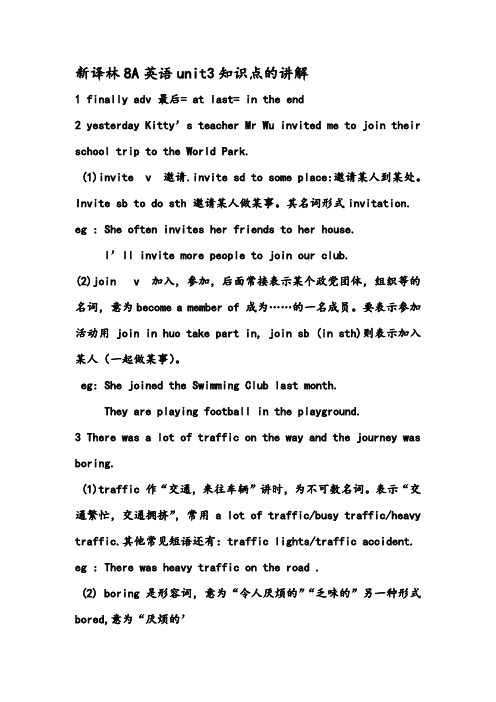
新译林8A英语unit3知识点的讲解1 finally adv 最后= at last= in the end2 yesterday Kitty’s teacher Mr Wu invited me to join their school trip to the World Park.(1)invite v 邀请.invite sd to some place:邀请某人到某处。
Invite sb to do sth 邀请某人做某事。
其名词形式invitation.eg : She often invites her friends to her house.I’ll invite more people to join our club.(2)join v 加入,参加,后面常接表示某个政党团体,组织等的名词,意为become a member of 成为……的一名成员。
要表示参加活动用join in huo take part in, join sb (in sth)则表示加入某人(一起做某事)。
eg: She joined the Swimming Club last month.They are playing football in the playground.3 There was a lot of traffic on the way and the journey was boring.(1)traffic 作“交通,来往车辆”讲时,为不可数名词。
表示“交通繁忙,交通拥挤”,常用a lot of traffic/busy traffic/heavy traffic.其他常见短语还有:traffic lights/traffic accident.eg : There was heavy traffic on the road .(2) boring 是形容词,意为“令人厌烦的”“乏味的”另一种形式bored,意为“厌烦的’eg : We are bored with her boring talk.4 We finally arrived at the park.Arrive 意为“到达”,是不及物动词,后面接地点名词作宾语时,常接介词in或at,分别表示到达大地方和小地方。
牛津译林版8A Unit3知识点讲解
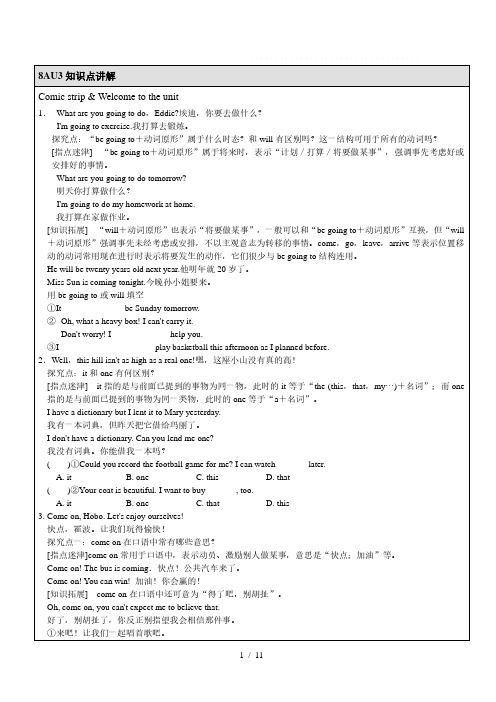
A. play
B. to play
C. playing D. plays
Reading
1.I'm doing fine here.我在这儿过得很好。 It was a fine warm day.这是一个晴朗、温暖的日子。 探究点:两个 fine 的用法相同吗? [指点迷津] 两个 fine 的用法不同。第一个 fine 用作副词,意为“够好,蛮不错”;第二个 fine 用作形容词, 意为“晴朗的”。 I am working fine here.我在这儿工作得挺好的。 It's a fine day today.今天是一个晴朗的日子。 [知识拓展] fine 用作形容词时还可指“身体好,气色好”。 He isn't fine today.今天他看上去气色不好。 ①他在这儿住得不错。
- Don't worry! I_____________ help you. ③I _____________________ play basketball this afternoon as I planned before. 2.Well,this hill isn't as high as a real one!嗯,这座小山没有真的高! 探究点:it 和 one 有何区别? [指点迷津] it 指的是与前面已提到的事物为同一物,此时的 it 等于“the (this,that,my…)+名词”;而 one 指的是与前面已提到的事物为同一类物,此时的 one 等于“a+名词”。
The street is 6______________. ②那条河约 76889 米长。
The river is about 76,889______________. ③这棵树约 4 米高。 The tree is about 4______________.
牛津译林8a unit3 知识点

Unit3复习重点单词词组1.This hill is not only amazing but also tasty!not only …but also…不但…而且…可以有一个主语,也可以连接两个并列的人或物,这个时候谓语动词就要次用就近原则:这本书不但有用而且很有趣。
(一个主语放在句首)The book is______ ______ ______ ______ ______ ______.不但他父母而且她也喜欢游泳。
(连接两个并列的人,not only放句首)______ _______her parents ______ ______she______ ______.2.If you want to go, please let me know as soon as possible.(1)as+adj/adv原级+as+possibie 尽可能…as soon as possible 尽可能快的as much as possible 尽可能多的= as soon as one can = as much as one canas often as possible 经常的as many as possible 尽可能多的= as often as one can = as many as one canEg. 我会尽快告诉你。
I will tell you as soon as possible.= I will tell you as soon as I can.(与主语一致)天太干,尽多地喝水。
It’s too dry, please drink water ___________.= It’s too dry, please drink water ___________.他们尽可能经常给树浇水。
They water the trees_________________.= They water the trees_________________.(2)if 引导的条件状语从句,时态为“主将从现”,即主句采用一般将来时,if从句采用一般现在时。
初中英语 牛津译林版8A Unit 3单元知识点归纳
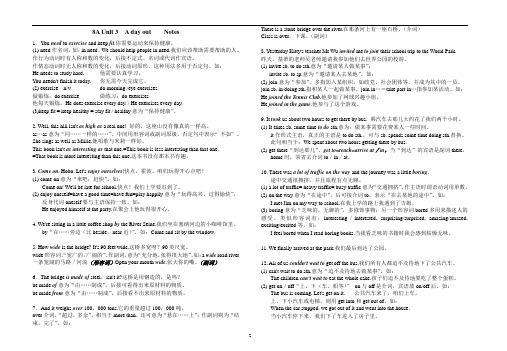
8A Unit 3 A day out Notes1.You need to exercise and keep fit.你需要运动来保持健康。
(1) need作名词,如:in need。
We should help people in need.我们应该帮助需要帮助的人。
作行为动词时有人称和数的变化,后接不定式、名词或代词作宾语。
作情态动词时无人称和数的变化,后接动词原形,这种用法多用于否定句。
如:He needs to study hard. 他需要认真学习。
You needn't finish it today. 你无需今天完成它。
(2) exercise n/v do morning /eye exercises.做锻炼:do exercise 做练习:do exercises他每天锻炼。
He does exercise every day. / He exercises every day.(3)keep fit = keep healthy = stay fit / healthy意为“保持健康”。
2. Well, this hill isn't as high as a real one! 好的,这座山没有像真的一样高。
as…as意为“同……一样的……”。
中间用形容词或副词原级。
否定句中表示“不如”。
She sings as well as Millie.她唱歌与米莉一样好。
This book isn't as interesting as that one.=This book is less interesting than that one.=That book is more interesting than this one.这本书没有那本书有趣。
3. Come on, Hobo. Let's enjoy ourselves!快点,霍波。
咱们玩得开心点吧!(1) come on意为“来吧;赶快”。
牛津译林版八年级上 8A Unit3 知识点梳理
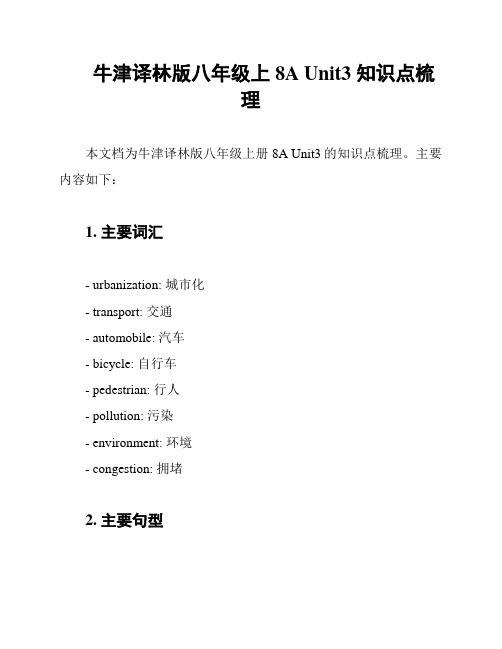
牛津译林版八年级上 8A Unit3 知识点梳理本文档为牛津译林版八年级上册8A Unit3的知识点梳理。
主要内容如下:1. 主要词汇- urbanization: 城市化- transport: 交通- automobile: 汽车- bicycle: 自行车- pedestrian: 行人- pollution: 污染- environment: 环境- congestion: 拥堵2. 主要句型- Urbanization is the process of making an area more urban.(城市化是使一个地区更加城市化的过程。
)- The increasing number of automobiles has led to more traffic congestion.(汽车数量的增加导致了更多的交通拥堵。
)- Riding a bicycle is a green and healthy way to travel.(骑自行车是一种环保健康的旅行方式。
)- We should take actions to reduce pollution and protect the environment.(我们应该采取措施减少污染,保护环境。
)3. 重要概念- Urbanization: the process of making an area more urban by developing infrastructure, attracting businesses, and increasing population.- Traffic congestion: the excessive amount of traffic that causes delays and slow movement of vehicles.- Green transportation: modes of transportation that are environmentally friendly, such as bicycles and public transportation.- Environmental protection: the practice of protecting the natural environment by individuals, organizations, and governments.以上是牛津译林版八年级上8A Unit3的知识点梳理。
牛津译林版八年级上 8A Unit3 关键知识点整理

牛津译林版八年级上 8A Unit3 关键知识点整理本文档整理了牛津译林版八年级上册 Unit 3 的关键知识点。
以下是每个知识点的概要:2. Topic 2: Cybercrime- Definition and types of cybercrime: hacking, identity theft, phishing, and cyberbullying.- Tips for online safety: using strong passwords, avoiding suspicious links and downloads, and being cautious with personal information online.- Consequences of cybercrime: financial loss, invasion of privacy, emotional distress, and damage to reputation.3. Topic 3: Social Media- Definition and popular social media platforms: Facebook, Twitter, Instagram, and WeChat.- Advantages and disadvantages of social media.- Responsible use of social media: protecting personal information, avoiding cyberbullying, and being mindful of online etiquette.4. Topic 4: Artificial Intelligence- Definition and examples of artificial intelligence (AI).- AI technologies and applications: virtual assistants, chatbots, facial recognition, and self-driving cars.- Ethical considerations and debates surrounding AI: job displacement, privacy concerns, and potential biases.5. Topic 5: Impact of Technology on Society- Negative effects of technology on society: addiction, privacy invasion, and social isolation.- Balancing technology use: setting limits, practicing digital detox, and fostering face-to-face interactions.以上是牛津译林版八年级上册 Unit 3 的关键知识点整理。
- 1、下载文档前请自行甄别文档内容的完整性,平台不提供额外的编辑、内容补充、找答案等附加服务。
- 2、"仅部分预览"的文档,不可在线预览部分如存在完整性等问题,可反馈申请退款(可完整预览的文档不适用该条件!)。
- 3、如文档侵犯您的权益,请联系客服反馈,我们会尽快为您处理(人工客服工作时间:9:00-18:30)。
Comic strip1. What are you going to do,Ediie?“be(am/is /are)going to+ 动词原形”构成一般将来时态,表示打算或计划做某事。
Be 的形式与主语在人称和数上保持一致。
-----What are you going to do tomorrow?----I’m going to visit my grandparents.中考链接----Do you have any plans for tonight?----Yes, I ______ at the new Italian restaurant in town.A. eatB. have eaten B. ate D. am going to eat2. I’m going to exercise.Exercise此处用作不及物动词,意为“锻炼”My father exercises every morning.拓展:○1exercise还可用作可数名词,意为“练习,一套动作”I have many exercises to do.Every morning, we see many old people doing morning exercises.○2exercise用作不可数名词,意为“锻炼”。
Do/take exercise意为“锻炼身体”Exercise makes us strong and healthy.I t’s important for us to take exercise every day.3. You need to take exercise and keep fit.(1)need此处用作及物动词,意为“需要”,主要有以下用法○1need sth需要某物They don’t need any help.○2need to do sth 需要做某事He needs to have a good rest.○3need doing sth 某事需要被做(与need to be done同义)These flowers need watering.拓展:need做情态动词讲时,没有人称、时态和数的变化,后接动词原形,主要用于否定句或疑问句中。
You needn’t become so nervous.-------Must I bring my homework now?No, you needn’t. You can bring it tomorrow.(2)keep fit意为“保持健康”keep 此处用作连系动词,意为“保持”;fit形容词,意为“健康的”与healthy意思相近。
More exercise makes you keep fit.4. Come on, Hobo.Come on此处意为“来吧;赶快”用于催促他人。
Come on,everyone. We’ll be late.拓展:Come on的用法有很多,在日常生活中经常使用该词组来表达不同的感情,传递不同的信息。
Come on多用于祈使句中○1激励别人Come on,you can do it!○2表示责备活不耐烦Come on,don’t lie.○3给别人加油或助威。
Come on!Come on!○4用于挑衅对方Come on,then, hit me!5. Let’s enjoy ourselves!Enjoy oneself “玩得愉快”,相当于have a good time/ have funWe enjoyed ourselves in the park.=We had a good time/ had fun in the park.I enjoyed myself.中考链接Last month, I went to the computer museum with my parents. We enjoyed _______ and learned a lot.A. usB. ourselvesC. ourWelcome to the unit1. Take care ! 保重!take care“小心,注意”。
take care单独使用时,表示提醒或警示等语气,相当于look out 或be careful.Take care ! The ice is thin.Please take care. The traffic is heavy.拓展○1take care 后还可跟动词不定式或从句。
Take care not to break the glass.Take care that you don’t cross the road when the traffic lights are red.○2take care of 相当于look after,意为“照顾,照看”Who is going to take care of the babies?2. We’re sitting in a little coffee shop by the River Seine.By此处用作介词,意为“在。
旁边,靠近”My house is by the river.She sits by that window.(1)这是一个现在进行时态的句子,用现在进行时表将来,此处are going to 中的to 是介词。
在英语中,go, come, arrive, leave, start等表示“位置移动”的动词,它们的进行时态往往表将来,含有意图、安排或打算的含义。
这种现在进行时比较生动,给人一种期待感。
它常常表示最近或较近的将来。
They are coming soon.When are you starting?中考链接I _______ the shops. Can I get you anything?A. go toB. went toC. have gone toD. am going to(2)the top of 意为“。
的顶部”,on the top of ………在。
的顶部Can you see the top of the mountain?There is a big clock on the top of the building.4. The bridge is made of steel, isn’t it?(1)本句是一个反义疑问句。
反义疑问句是在一个陈述句后加一个简短问句构成。
简短问句的结构为“助动词/情态动词/连系动词be(肯定或否定形式,否定形式时必须缩写)+代词(与主语对应)”。
在使用反义疑问句时要注意以下几点:○1前面的陈述句如果是肯定的,简短问句就要用否定形式;前面陈述句如果是否定的,简短问句就要用肯定形式;○2简短问句的主语必须是代替前面主语的代词○3简短问句的谓语动词在时态和人称上与前面陈述句的谓语动词保持一致。
You like music, don’t you?They won’t join us, will they?注意在回答反义疑问句时,只要答语的事实是肯定的,就要用yes,只要答语的事实是否定的,就要用no.-----She isn’t going to buy a book, is she?------No, she isn’t.-----Mr Smith isn’t American, is he?------Yes,he is.(2)be made of意为“由。
制成”The old house is made of stone.5. Yes, and it weighs over 100,00 tons.(1)weigh此处用作动词,意为“重;有。
重”The baby weighed about 5 kilograms.拓展○1weigh还可用作及物动词,意为“称。
的重量”He wants to weigh the cotton.I weighed myself just now.刚才我称体重了。
○2weigh名词,意为“重量”My weight is 150 pounds.○3提问重量可用what 或how much.What’s his weight?/ How much does he weigh?(2)over此处用作介词,意为“超过”,相当于more thanThese are over 2,000 students in our school.Reading1. I am doing fine here.Fine此处用作副词,意为“够好,挺不错”,常用于口语中。
My computer works fine.You are doing fine.拓展:fine常用作形容词意为“好的;健康的;晴朗的”That’s a fine book.My grandparents are fine.It’s a fine day, isn’t?2. Yesterday Kitty’s teacher Mr Wu invited me to join their school trip to the Word Park.(1)invite及物动词,“邀请”invite sb to do sth意为“邀请某人做某事”Li Daming invited us to climb the hill and have a picnic.拓展invite sb to。
意为“邀请某人去。
”,to是介词,后接表示地点或事件的名词。
Who should we invite to the factory?I invited my friends to my birthday party.中考链接My friend invited me ______ the art club, and I accepted it with pleasure.A. joinB. to joinC. joinedD. joining(2)join此处用作及物动词,意为“加入,参加”When did you join the swimming club?Would you like to join us?3.The sun was shining in a clear blue sky.(1)本句中为过去进行时态,表示过去某一时间正在进行的动作或状态。
其构成形式为“was/were+v.ing”I was doing my homework at ten yesterday morning.My parents were cooking dinner when I got home.中考链接I ______ with my parents when he rang me up yesterday afternoon.A. am shoppingB. am shoppingC. was shoppingD. was shoping(2)shine(shone,shone)此处用作不及物动词,意为“照耀,发光”The sun is shining and it’s very warm.(3)clear此处用作形容词,意为“晴朗的”。
